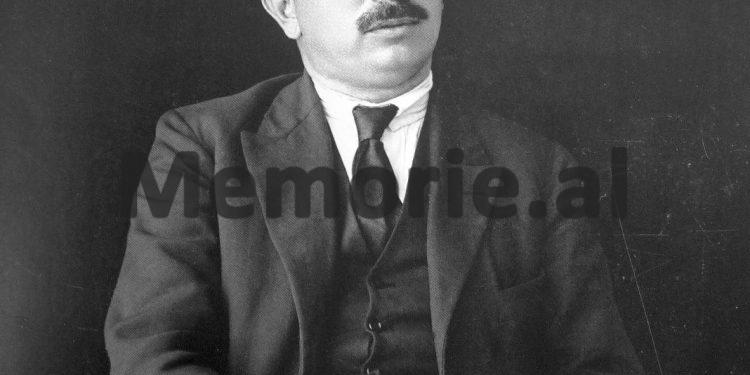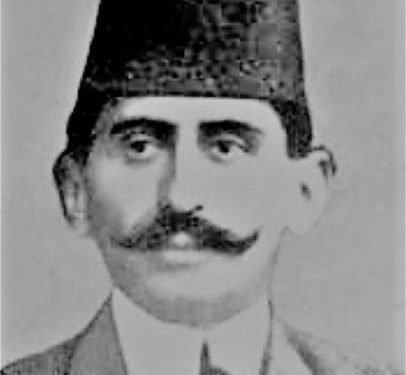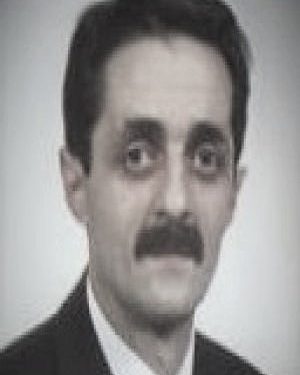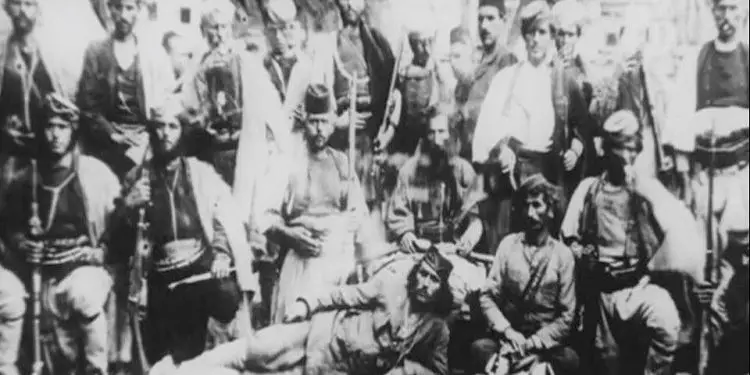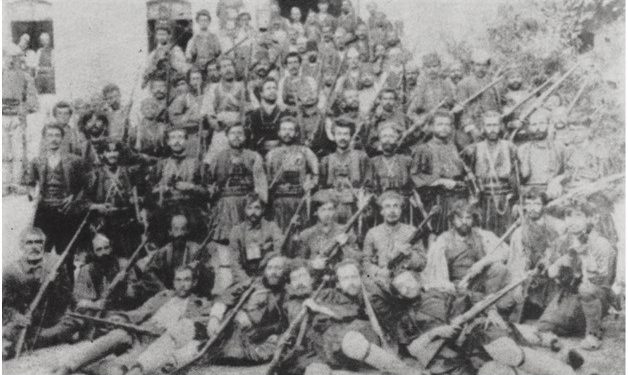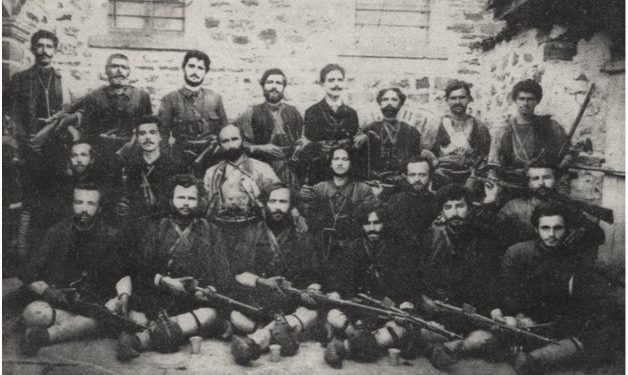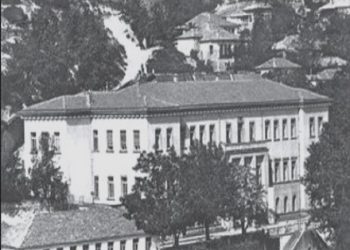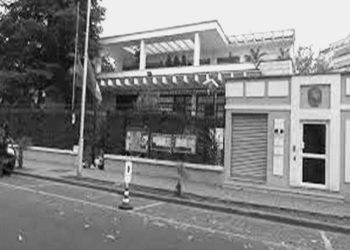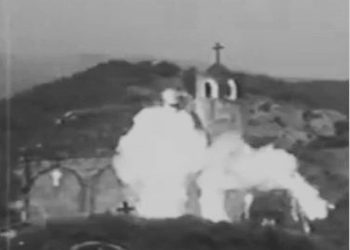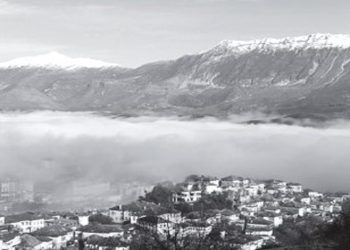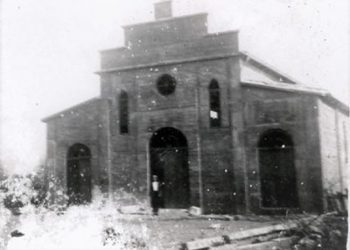By Eugen SHEHU
Memorie.al / Delvina, that beautiful city in the lap of the Lunxheria mountains, has been for centuries a high example of bravery and survival of Albanians. In the years 1820-1847, the southern city became the hearth of the uprising against the Turkish reforms of the Tanzimat, while in the glorious years of the Albanian League of Prizëren, the men of this city marched towards Frashër, in whose Teqe the faith was made, what from Janine to Kruja and Kotor. These men would hold in their bosom, the brave as; Çerçiz Topulli, Mehmet Sejko, Dervish Hima, Nikolla Ivanaj, Bajo Topulli, Shahin Kolonja, etc., in the first years of the twentieth century, when the Albanian autonomist movement was taking off. It was in this city, troubled by wars for freedom, that Namik Delvina was born on June 18, 1875.
A very wise child, as they told him later, Namiku would take his first lessons in Delvina, in the only Turkish school in the city. But his father would pay for his sons to be tutors, and seeing that they liked books more than commerce, he sent his sons to the “Zosimea” gymnasium in Ioannina. The two sons Namiku and Sulejmani sat like this in the gymnasium of Ioannina, following in the footsteps of the Frashërlinjes, who had studied in this same gymnasium. Although the lessons at “Zosimea” were difficult (Greek, Roman and French culture was taught there), Namik would achieve very high results. Furthermore, he, in cooperation with other students, tried to spread the beautiful language of their mother in the Albanian districts.
After the macabre murder of Ali Pasha Tepelena, in Ioannina, the High Gate banned the Albanian language with strict laws. Only Turkish and Greek were taught there, so Namiku with his brother and other compatriots did what was possible for the spread of Albanian, especially in writing. This was the reason that in 1894, although a student at “Zosimea”, Namik Delvina was arrested by the Turkish gendarmerie authorities of Ioannina, under the pretext of “showing nationalist feelings, teaching others the Albanian language”. Namik’s arrest could not be easily conveyed to Ioannina. Many of the high school students and teachers, as well as members of the long-known association “Brotherhood of the Albanians”, raised their voices demanding the release of Namik.
After spending a few weeks in prison, he was released but on the condition that he would appear at the Ioannina gendarmerie from time to time. Even in these conditions of semi-imprisonment, Namik Delvina did not stop his efforts for the cultivation of the Albanian language and especially the spread of Albanian books, in his own Albania closed in lawsuits. After finishing “Zosimea”, in the fall of 1895, Namiku went to Berlin and “started higher studies at the University of Political Sciences”. (Central State Archive-Tirana. Fund 19, file 32, sheet 223). Even in the halls of this faculty, Namiku would always feel proud of his race, of the Albanian nation, which, although small in number, had made great sacrifices for Europe. In Berlin, not infrequently the Albanian student from Delvina would enter into polemics with the German pedagogues, defending in every case, the past of his homeland.
Namiku, although he finishes his studies excellently, cannot get a doctorate in Berlin, due to low financial income. In this way, he returns to his homeland, wanting to contribute even a little to the awakening of the nationalist consciousness of Albanians. Delvina would welcome his son with open arms. own. In the beautiful two-story house, the men would welcome him, while a gendarme would break the news that the prefect of Gjirokastra wanted to meet him. The next day, Namiku appeared at the prefecture and while the prefect was talking to him about some important jobs, Delvina’s son replied that; he wanted to work for his country and not for Istanbul. In 1901, Namik’s house was turned into a secret school for the Albanian language. Dervish Hima, Nazif Haderi, Sabri Preveza, Lesko Raça, etc. would often spend their evenings there, who would discuss the possibilities of obtaining Albanian books, which were published in Sofia and Bucharest, as well as their distribution in all the Albanian provinces. .
Namiku himself started working as a teacher in the city school of Delvina. Behind this task, he could more safely spread the Albanian language, through the new Albanian generations, who would later become carriers of the ideals for the autonomy of the Albanian lands. His efforts caught the attention of the Turkish authorities of the city, and at the end of 1902, gendarmes organized a surprise raid on Namik’s house. During this check, a large number of books in the Albanian language were found, which led to Namik’s arrest. But this time too, the people of the city intervened, demanding the release of their teacher. It was of course the authority of Sulejman, his brother who was climbing high levels in Istanbul, in which case Namik was allowed to teach again in the city. However, Namik’s activity could not be confined to the houses of the city. Using the many friendships of the family, Namiku tried to convey his Albanianism, even further.
“He expanded his activities to the villages above Delvina, where he justified his trips in different ways, sometimes he went for friendship, sometimes to talk with the parents of the students, other times to see the state of the schools. In these meetings he spoke to the villagers about the Albanian nation and language. He often called village activists to his house and instructed them on how to propagate the national idea” (Museum Fund-Delvinë). In the years 1905-1906, Namik Delvina will come into contact with Bajo Topulli, (at that time the director of the Manastir high school) one of the men who unabashedly supported the autonomist ideas for Albania. Bajo Topulli saw in the son of Delvina, a man determined to the end for the freedom of Albania, so he assigned him to raise in Delvina and its surroundings, the first detachments of fighters, according to the example of those that were created by order of the secret committee of the Monastery. While in the autumn of 1907, the secret society “Homeland” was created in Delvina, at the head of this society, the patriots of the south of the motherland unanimously chose Namik Delvina, who would remain a brave and wise soldier even after that. of our national movement.
In the years 1907-1909, the Society “Atdheu” would illegally distribute, in all the villages of the south, Albanian primers and books printed in Sofia, as well as weapons and ammunition for the detachments of Albanian committees. Namik’s house itself, turned into a warm hearth of hospitality, for the group of Çerçiz Topulli or the Çameria comitas, who had put the rifle to the Greek Andarts. On the platform of the ideas of our national renaissance, the issue of the Albanian language is seen as something primary. Especially in the conditions when the Ottoman Empire was getting sick, our Shovene neighbors rose up whole, wanting to leave the glorious history of the Albanians in the dark. For this reason, at the beginning of 1909, Namik Delvina, together with Hysni Hoda, Leska Raça, Ismet Shushi and Petro Delvina, opened the first Albanian school in the city of Delvina, where not only students from the city neighborhood participated, but also of the surrounding villages. On the opening days of the school, Namik Delvina wished the teachers and students a happy journey of knowledge. He conducted the first lesson, bringing back to the attention of delvinjo students, the bright history of our nation, since Skanderbeg. Although after a few months the school was closed by the Young Turks, Namiku took measures so that the lessons were not interrupted but continued illegally, in the houses of the patriots of Delvina.
Writing the Albanian language with Latin letters (just as it was decided in the Congress of Manastir), was among the biggest concerns of Namik, who, although he was invited to go to that historic assembly, did not participate because he was in Italy. In February 1910, some patriots of Chameria invited Namik to Ioannina, in which case he would speak about the Albanian issue. In the Albanian press of that time, we learn that: “Namiku is in the Albanian club “Bashkimi”, in Ioannina, in a meeting attended by more than 200 people. In this meeting, he gives a long speech on the antiquity of the Albanian nation, its current state and the dangers that threaten it: then, he talks about the progress of the Albanian language. Namik ends the speech with the slogan; “Long live the Albanian Nation! Long live Albania” (Newspaper “Zgjimi i Albania”, March 10, 1910).
Meanwhile, in this same meeting of patriots in Çameri, Namik Delvina would inform all his compatriots that; the great hour has come down and you don’t have to wait. Textually in the press of the time he expresses; “We Albanians, where we are, unfortunately, are in a very bitter state. Salvation and exaltation do not come from sitting idly by. We have not provided the most basic needs today; language and schools, today we are in the twentieth century, we are looking like in the dark ages. The language ensures our nationality, the school enlightens and elevates us, makes us happy with a high and bright future. We know well, education unites us and strengthens our beloved homeland. Language and school are the first needs because today’s century will severely punish us if we don’t have these things that ensure life and nationality”. (Newspaper “The Awakening of Albania” March 7, 1911).
It is already known that in the spring of 1911, the High Gate sent Shefqet Turgut Pasha to the North of Albania, at the head of 40 thousand regular soldiers, to extinguish the rebellious spirit of the “Arnauts”. The Turkish Pasha committed great atrocities against insurgent squads led by Ramadan Zaskoci, Isa Boletini, Ded Gjon Luli, Sadik Rama, etc. Under these conditions, Albanian patriots in the south thought of a coordination of combat activities. Themistokli Gërmenji was an outstanding patriot, together with the Topulli brothers, who in May-June 1911, went to Delvina and were generously received at Namik’s house. It is from this house that the movements against the Young Turks are conceived, with the aim of opening several battle fronts, forcing Shevqet Turgut Pasha to stop the bloodthirsty teaching in Kosovo. Initially, the squad commanded by Namik Delvina consisted of 40-50 men from Labëria.
Then, when the Turkish authorities started building wells to shoot Namik, the squad left Delvina and went to Chameria. In these conditions, it came to be increased and in cooperation with the detachments of Mehmet Sejko and Muharrem Rushit, they numbered around 300 fighters who were terrorized by the High Gate, in the whole of Çamëria. But Namik Delvina’s patriotic vision could not be limited to just a few battles against the Turks and the retreat through the mountains. He foresaw the imminent fall of the Empire, so he wanted the Albanians of the four vilayets to be united both in war and in ideas, language and school. With the direct efforts of Namik, on June 30, 1911, a gathering of the main heads of the 16 kazas of the vilayet was organized in Ioannina. In this secret gathering, Namik Delvina was one of the first to raise his voice for “the administrative autonomy of the country, as a natural right of the Albanian nation” (Archive of the Institute of History-Tirana. Document Fund of Vienna, Report of the Austrian Consul Hungarian in Ioannina, sent to his ambassador in Istanbul, on July 16, 1911).
It is this consul who, through a secret telegram, informs his government that in the months of July-October of the same year, Namik Delvina has secret connections with Dervish Hima, Nikola Ivanaj, Ismail Qemali and Nexhi Draga. These connections, according to Austro-Hungarian sources, are the only ones for the organization of affairs, in favor of the Albanian national movement. During the autumn of 1911, Namiku took on the task of uniting the detachments of Delvina, Saranda, Nivica and Borsh, foreseeing further, the connection of the commands of these detachments with the major Albanian movement for independence. Now he is expected as a prominent political thinker not only in Saranda, but also in Çameri, Gjirokastër, Kolonje and even Vlora. The continuous contacts with Ismail Qemali, Nexhip Draga and Sali Gjuka give new breath to the actions of his gang against the high administration of Istanbul.
This is the reason why, in the fall of 1911, the Turkish gendarmerie authorities of Gjirokastra discovered Namik’s traces and activities. He was also ambushed in the village of Zhulat, but it was the loyalty and bravery of his warriors, who pulled him out of the siege miraculously. Thanks to the considerable acquaintances that Namiku had with the great Albanian families, he used these friendships to arm the southern detachments with weapons and ammunition. The florin paid by the great Albanian doors, this son of Delvina used it all for the realization of the sacred dream of the Albanians, eternal freedom. The reputation of Namik Delvina has now grown significantly in almost the entire Albanian south, from Delvina to Preveza. In March 1912, when he went to Delvina after so many months as a fugitive, the people, friends and comrades welcomed him with open arms. Even for this reception, the Austro-Hungarian consul in Ioannina, sent a telegram to Vienna, where, besides the others, he announced “Namik Delvina returned these days to his hometown, where he was received with love by his fellow citizens. The people elected him the mayor of the city…! In this position, he is undertaking a series of progressive reforms”. (Archive of the History Institute – Tirana. Fund of Vienna documents, doc. Dt. March 17, 1912).
This time too, the Young Turks tried to minimize or isolate Namik’s patriotic activity. Valiu of Ioannina sent him a telegram telling him to appear there, to receive instructions regarding the new function. While Namik’s answer was that he could not receive instructions from a Turkish Pasha, as to why Turkey had not chosen him for that task, but the people of Delvina with his free vote. Faced with this attitude, the High Gate, which was collapsing day by day, preferred to remain silent. In the function of the mayor of the city, Namik Delvina, in a special absence, he tried to immediately open Albanian schools, in villages and cities. Being aware of the efforts of the Greeks for the annexation of the Albanian territories, Namiku starts working to open these schools also in the villages of Chameria, near Delvina and Saranda. He brought the gendarmerie of the city under control, removing the Turkish officials and placing there, among the most prominent patriots of the Albanian south, this is the reason that in Delvina, in the summer and autumn of 1912, patriots such as Mehmet Sejko, Musa Demi, Dervish Hima, Shahin Kolonja, etc. The raising of the flag in Delvina, in December 1912, was also emotional. Namiku maintained secret connections with the Albanian patriots throughout the months of November.
Meanwhile, it turned into an impassable barricade of Greek Orthodoxy, which wanted to raise the Greek flag in Delvina, Gjirokastër and Kolonje. It is well known that the armies of Athens, in the fall of 1912, had occupied Korça and Gjirokastra, but Delvina with all the villages remained unyielding. Also for reasons of Namik’s vision, he did not participate in Vlora, but sent other patriots there, while he himself fought against the Greek hordes. The flag raised in Vlora on December 28, 1912, would mark a new era for Albanians. Due to the great communication difficulties, the news about the raising of the flag in Delvina went there in the morning of December 4. Namik Delvina was the first to receive this news and ordered the telegraph operator to fire his rifle as a sign of joy. Afterwards, the red and black flag flew free in the city, through a popular joy. In a telegram that Namik Delvina would send to Ismail Qemali, on December 5, 1912, he would express, in addition to others; “The life and existence of all Albania is in your hands, which will save it from great danger one day. We are grateful for your patriotism and dominant wisdom. In the name of all, one name with the nation, we express our gratitude and hurry to congratulate the enlightened presidency”. (Central State Archive – Tirana. Provisional Government Fund of Vlora, file 27, page 16).
With the instruction of the Minister of Education, of the first Albanian state, Luigj Gurakuqi, Namik Delvina started working on the establishment of Albanian schools in the south of the mother country. Of course, his patriotism would shine here as well. Right now, in opening these schools, he would face not only the medieval mentality but also the Hellenic ultra-chauvinism, aided and abetted by the Andart gangs. In the years 1913-1915, Namik Delvina would set up a series of schools in the entire Albanian south and, not infrequently, he would be at the head of the Albanian national forces, against the Hellenes who sought the fusion of Albania between the Greeks and the Serbo-Slavs and the Bulgarians. In January 1920, in the Albanian government created by the Historical Assembly of Lushnja, Namik’s brother, Sulejman Delvina, took the post of the head of the government. There were many rumors at that time that Namiku should go to Tirana and lead Albanian education, as one of the first pioneers of the Albanian language and school, but he refused, as he had always thought that he was more valuable there in the positions of money against the Greek hordes, than in Tirana.
At the beginning of 1921, as everywhere in Albania, the National Defense Committee was established in Delvina as well. With dozens of nationalist patriots from Vurgu to Kolonje, they proposed and put Namik Delvina at the head of this Committee. The great patriot and visionary, fought for years, especially in the diplomatic and propaganda aspect, for the Albanian lands to have their independence and freedom. In 1925, he published the newspaper “Rilindja Shqiptare” in Saranda. All the patriots of the south like the ideas and theses written on the pages of this newspaper, so they contribute to its distribution, especially in the Chams, becoming spokespeople for the aspirations for freedom of the Cham population. Before closing his eyes, on January 23, 1933, he asked to be buried in the cemetery of Kruja. With thousands of Albanians from all faiths, and especially from all regions, they respectfully escorted him to his final residence. The magazine “Leka” in February 1933, on page 6, would write: “On January 23, the great veteran Namik Delvina died, who served the country with arms, pen and work…”! He closed his eyes but the work remained in the souls of entire generations of patriots and patriots of yesterday and today. Memorie.al
(Bern-Switzerland)




